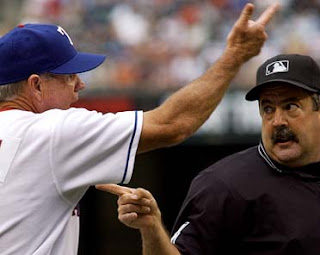
THE CAMP
3 strikes and you're out. It seems pretty simple, right? Well it's not that easy. To become an umpire at the professional level takes skill, technique and many other attributes. It's also a skill that isn't just acquired naturally. One has to work hard to become a good umpire. It takes a ton of practice and a lot of improvement. In order to become better umpires, 50 men and 1 woman attended the MLB Umpire Camp at the Urban Youth Academy in Compton, California. The camp was a week long event where participants learned skills both on and off the field. During the morning, the participants would go to a hotel in Long Beach where they would be taught in a classroom-like environment; they would learn everything that they could about the rules, positioning, etc. Once they finished their work in the classroom, they would head to the fields in Compton to do their daily field work. This work consisted of drills teaching various things such as balks. After this was finished, it was time for the umpires to put what they learned to the test. They would each umpire for an inning of a baseball game with college-level players. During this inning, each umpire would get game experience, and at the same time, would be graded by the professional umpire teachers on their performance. The professional umps would grade the plate umpire on the strike zone, while the base umpire would be graded on positioning, calls made, etc.
THE PARTICIPANTS
If you watched the video above and saw the titles of Mike Gervasoni and Michael Roarty, you would immediately realize that the variety of professions represented at this camp was enormous. The skill level of the umpires ranged dramatically, from near professional to complete amateur. Gervasoni is a marine who wants to become a little league/middle and high school umpire when he retires, which is why he is at the camp. Meanwhile, Roarty is at the camp to refine his skills and he hopes to do that by learning from professionals. While there are men such as Roarty and Gervasoni who have no intention of becoming professionals, there are 8 other men who are taking the field this week in countries such as Canada, Japan, Mexico and Puerto Rico. These four countries are the sites for this year's 2009 World Baseball Classic. Since, the WBC has 4 man crews, 10 of the international umpires came to the camp to get accustomed to that system. They did the classroom work and the drills like everyone else at the camp, but they are the lucky ones that will be on the same field as players such as David Ortiz, Hanley Ramirez, Ichiro Suzuki, Jake Peavy and Derek Jeter.
THE TEACHERS

The 51 participants weren't going to travel from all over the world just to be taught by inexperienced umpires. Instead, they got eight current umpires and four MLB Umpire Supervisors. The professionals were crew chiefs, Tim Tschida and Larry Young, and umpires Gary Cederstrom, Kerwin Danley, Brian Gorman, Sam Holbrook, Jerry Layne and Brian Runge.
